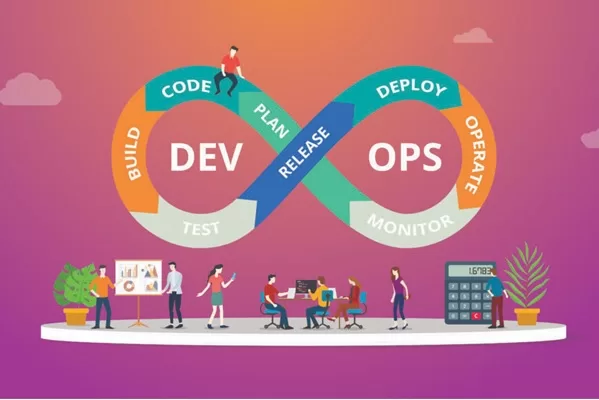Brand Strategy
Goals and Vision of Devops Strategy

DevOps is a strategic approach to software development that focuses on collaboration and communication between developers and operations teams. It’s designed to streamline the process of creating, testing, deploying, and maintaining applications. By combining tools from both dev and ops sides of the organization into one cohesive system, DevOps helps companies achieve greater agility in their business processes while also reducing costs. Read on to learn more about devops strategies!
Definition of DevOps Strategy
A devops strategy defines how a company’s dev and ops teams collaborate to create, test, deploy, and maintain applications. It includes elements like coding standards and conventions, processes for deploying software updates, testing frameworks, and operational best practices. The goals of devops strategies are to improve the speed at which applications can be released while maintaining quality and security.
Benefits of a DevOps Strategy
- Increased speed and agility: A devops strategy allows for the rapid deployment of applications, with teams able to deploy updates much faster than traditional methods. This means quicker time-to-market for new features, products, and services.
- Improved scalability: By automating processes and streamlining workflows, devops strategies make it easier to scale applications as needed. This means that companies are able to quickly add more users or process more data without having to manually manage their infrastructure.
- Reduced costs: Automating processes and streamlining workflows also allows for cost savings, since less manual labor is needed for managing infrastructure. Additionally, team members can focus on higher-value tasks instead of mundane or repetitive ones.
- Enhanced security: Devops strategies can help ensure that applications are secure, since updates are tested and deployed in a predictable way. This also helps reduce the risk of breaches due to human error or malicious code.
- Improved collaboration: By bringing together developers and operations teams into a unified system, devops strategies foster collaboration and communication. This helps teams better understand each other’s needs and deliver faster results.
By following a devops strategy, companies can benefit from increased speed, scalability, cost savings, enhanced security, and improved collaboration. This makes an effective devops strategy essential for any organization looking to optimize their business processes and stay ahead of the competition.
Goals of a DevOps Strategy
Now when we know what is DevOps and its benefits, let’s see what are the goals of a devops strategy:
- Improving Agility and Time to Market: A DevOps strategy should focus on improving the speed at which applications can be released while maintaining quality and security.
- Enhancing Collaboration Across Teams: DevOps strategies should promote collaboration between developers and operations teams. This helps ensure that both sides understand each other’s needs and work together to achieve their goals.
- Improving Security: DevOps strategies should focus on ensuring that applications are secure by using automated testing, continuous deployment, and other measures.
- Automating Processes and Streamlining Workflows: DevOps strategies should strive to automate processes and streamline workflows, allowing for cost savings and increased productivity.
- Enhancing Security: DevOps strategies should focus on ensuring that applications are secure by using automated testing, continuous deployment, and other measures.
By setting these goals for their devops strategy, organizations can make sure that they are taking advantage of the benefits of DevOps while also ensuring that their applications are secure.
How to implement a successful DevOps strategy
Implementing a successful devops strategy requires collaboration between developers and operations teams, as well as the adoption of agile processes. Here are some steps organizations can take to ensure their devops strategy is successful:
- Create a culture of collaboration: It’s important for developers and operations teams to work together in order for the devops strategy to be successful. This can involve sharing knowledge, understanding each other’s needs, and working together to achieve common goals.
- Adopt agile processes: Agile processes such as continuous integration (CI) and continuous delivery (CD) are essential for a successful devops strategy. CI/CD allow teams to quickly deploy updates while also ensuring quality and security.
- Utilize automation: Automating processes and streamlining workflows helps ensure that the devops strategy is successful. Automation can also reduce costs, since less manual labor is needed for managing infrastructure.
- Review regularly: Regularly reviewing and analyzing how the devops strategy is working allows organizations to make necessary adjustments and ensure that their applications are secure.
By taking these steps, organizations can successfully implement a devops strategy and take advantage of its benefits. Devops strategies are essential for any organization looking to optimize their processes and stay competitive in today’s market.

source: amazonaws.com
Examples of companies who have implemented successful strategies
There are many companies who have implemented successful devops strategies, such as Amazon, Google, Netflix, and Microsoft.
- Amazon: Amazon has been a long-time proponent of devops and utilizes automation to ensure that their applications are released quickly while also maintaining quality. They also leverage open source software to reduce costs and keep their infrastructure secure.
- Google: Google has implemented a devops strategy that focuses on improving collaboration between teams and automating processes. They have also adopted agile practices such as continuous integration and delivery to ensure their applications are released quickly and securely.
- Netflix: Netflix has used DevOps to increase their agility, reduce costs, and improve security. They use automation to quickly deploy applications while also ensuring quality.
- Microsoft: Microsoft has implemented a devops strategy that utilizes automation, cloud computing, and agile practices to reduce costs and improve security. They have also invested in open source software to ensure their applications are secure and up-to-date.
By looking at how these companies have implemented their DevOps strategies, organizations can get an idea of what a successful strategy looks like and apply it to their own operations.
Conclusion
The goal of devops strategy is to combine the development and operations teams in order to improve collaboration, optimize processes, and deliver value to customers faster. DevOps strategies can help organizations achieve agility, enhanced communication between teams, automated processes, improved security, increased efficiency and productivity, streamlined communication and information sharing, the ability to deploy updates quickly with continuous delivery, and an environment that encourages innovation and experimentation. By adopting a devops strategy, organizations can become more agile and responsive, allowing them to stay ahead of the competition.




















































